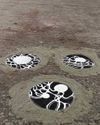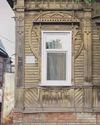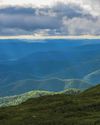TIMUR PUSTOGACHEV STOPS AND STARES AT A MOUND OF small pebble shards. In the sea of rocks that is the Altai’s Chikhacheva Ridge, and just a half-tone darker than its immediate surroundings, this spot has for some reason caught his eye.
“Yup, a snow leopard was here,” Sergei Spitsyn confirms. An expert from the Altai Nature Reserve, Spitsyn is this morning taking four of us up a hitherto unexplored rim, hoping to find new tracks left by the rare animal. “This is an old one, but it’s a scrape pile alright – left maybe a week ago.”
Scrape piles, pugmarks and clawrakes: our team has plenty to learn as we huff and puff to keep up with Spitsyn, a sprightly, silver-haired researcher who made snow leopards in the Altai his field of scientific study two decades ago because, as he says, “someone had to do it.” Since then, he has managed to trace the big cat’s main routes in the area, determining where to set up camera traps – small plastic-encased photo and video equipment that snaps images when it senses movement in its field of vision. Spitsyn, or Sergei Vladimirovich, as we call him, moves and speaks with the efficiency of someone who has spent much of his life in the field, in treacherous environments. But he generously shares his knowledge of the area and the species, Panthera uncia – the elusive beast nicknamed “the ghost of the mountains” – an animal that inhabits high-altitude regions of Asia that are so harsh that researching the cats is a far from comfortable pursuit.
I am one of a group of fourteen who have each paid R14,000 ($235) for a week-long trip to Russia’s Asian underbelly, the Altai Republic, a region slightly bigger than Portugal that happens to share a border with Kyrgyzstan, China and Mongolia. For two full days we zip along the historic Chuysky Trakt, or Chuya Highway, a road stretching almost 1,000 kilometers from Novosibirsk to the border with Mongolia. It is a road one local native, the famed actor and director Vasily Shukshin, compared with “the imprint of a whip that has cut the mountains.”
Diese Geschichte stammt aus der March/April 2017-Ausgabe von Russian Life.
Starten Sie Ihre 7-tägige kostenlose Testversion von Magzter GOLD, um auf Tausende kuratierte Premium-Storys sowie über 8.000 Zeitschriften und Zeitungen zuzugreifen.
Bereits Abonnent ? Anmelden
Diese Geschichte stammt aus der March/April 2017-Ausgabe von Russian Life.
Starten Sie Ihre 7-tägige kostenlose Testversion von Magzter GOLD, um auf Tausende kuratierte Premium-Storys sowie über 8.000 Zeitschriften und Zeitungen zuzugreifen.
Bereits Abonnent? Anmelden

Sidewalk Art
The lamentable state of Russia’s roads and sidewalks has long been fertile ground for memes and jokes. Irkutsk artist Ivan Kravchenko decided to turn the problem into an art project. For over two years he has been patching ruts in city sidewalks with colorful ceramic tiles.

Sputnik V: First Place or Long Shot?
The Russian vaccine seems top-notch, but low public trust and a botched rollout remain formidable barriers to returning to normalcy.
the Valley of the Dead
On the Trail of a Russian Movie Star

Food & Drink
Food & Drink
POLAR YOUTH
Misha Smirnov has the day off. There are the traditional eggs for breakfast and the usual darkness out the window.

Russian Chronicles
Russian Chronicles
A People on the Brink
Over the past century, the ancient people known as the Votes has been exiled twice, has seen its language banned, and has faced the threat of having its villages razed. Today, although teetering on the verge of extinction, it holds fast to one of the last rights it enjoys – the right to bear and to say its own name.

Tenders of the Vine
Visiting Russia’s Nascent Wine Region

Restoring the Future
A Small Town Gets a Makeover

Ascending Anik
Here I stand, on the summit of Anik Mountain, drenched to the bone amid zero visibility, driving rain, and a fierce wind.